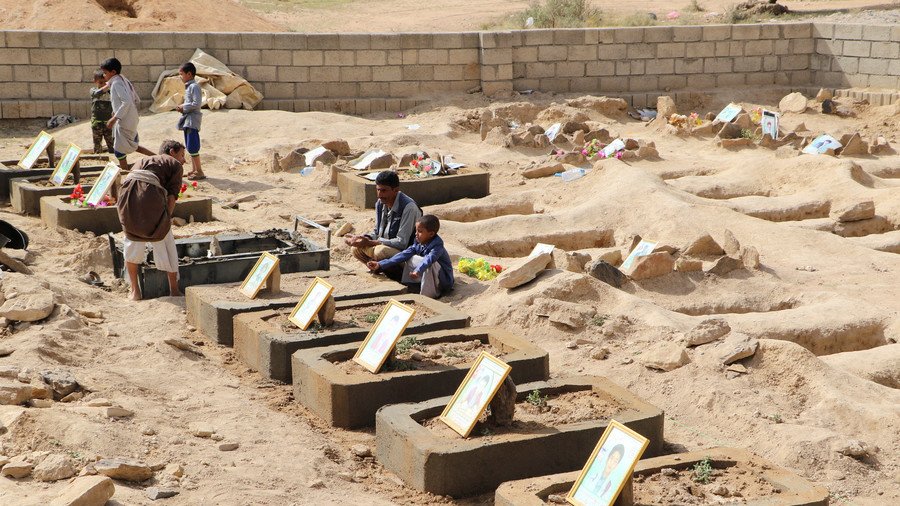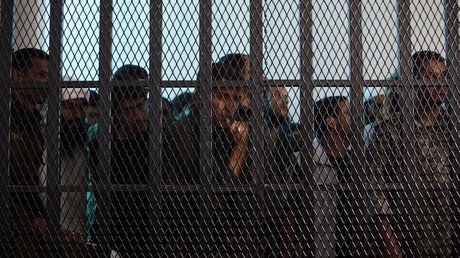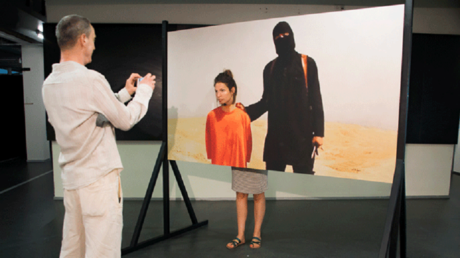Pompeo says Saudi coalition exercising caution in Yemen – facts show that’s not true

US Secretary of State Mike Pompeo has told Congress that the governments of Saudi Arabia and the United Arab Emirates are doing enough to protect civilians in their campaign in Yemen. The facts however, tell a different story.
Pompeo said in a certification statement Wednesday that ending the three-year conflict is a national security priority for President Donald Trump, and that the US will “continue to work closely with the Saudi-led coalition,” to end the war.
The certification is a requirement of the National Defense Authorization Act, an annual bill that sets out the US military’s vast budget and policies for the coming year. President Trump signed the 2019 NDAA into law in August.
Yemen’s civil war, ongoing since 2015, pits Iranian-backed Houthi rebels against the government of Abdrabbuh Mansour Hadi. Hadi is supported by a coalition of Arab and Gulf states, including Saudi Arabia and the United Arab Emirates, which is backed by US intelligence and logistical support.
.@SecPompeo certifies to Congress that #SaudiArabia and #UAE are taking “demonstrable actions to reduce the risk of harm to civilians and civilian infrastructure” in #Yemen. pic.twitter.com/M4s47sJNjH
— Matt Lee (@APDiploWriter) September 12, 2018
Amid a mounting civilian death toll, Defense Secretary James Mattis said last month the US intended to continue backing the Saudi-led coalition regardless. He said Wednesday he agrees the Saudi and Emirati governments are making “every effort to reduce the risk of civilian casualties.”
In reality, a damning UN report has blamed all sides in the Yemen conflict of committing war crimes. Airstrikes by the Saudi-led coalition were found responsible for most of the documented civilian casualties, and UN investigators said that these strikes indiscriminately targeted “residential areas, markets, funerals, weddings, detention facilities, civilian boats and even medical facilities.”
A coalition airstrike last month killed 50 people, mostly children, when it obliterated a school bus with an American-made 500lb, laser-guided bomb. Human Rights Watch called the bus bombing an apparent war crime, and urged Western countries to “immediately halt weapons sales” to Riyadh.
A disturbing and graphic video shows shocked and blood-soaked children taken to hospital immediately after the attack.
Another “egregious” example was the March 15, 2016 strike on Jhamees market, which killed more than 100 civilians, 25 of whom were children. The UN estimates there have been 6,660 civilian deaths between March 2015 and August, but the true figure is believed to be higher.
The UN report found that these attacks raised “serious questions about the targeting process applied by the coalition.” Within the coalition itself, differing accounts of these strikes have surfaced. After the bus attack, one Saudi spokesman flat out denied that a school bus was hit, and said the bus was full of “Houthi commanders.” Meanwhile, an internal investigation concluded that “mistakes” were made when carrying out the strike, the closest thing to an apology the coalition has offered.
Another massacre today committed by #SaudiaArabia warplanes killing 43 children on a school bus and injuring 60 others .. the #UNICEF provides backpacks and the Saudis bomb the school bus #YEMENpic.twitter.com/0l1WHZHqIX
— Yemeni1987 mm (@maystry1987) August 9, 2018
Emirati forces, which control southern Yemen directly, have been accused of arbitrarily detaining opponents, and subjecting them to torture and inhumane treatment. Prisoners in Emirati-controlled jails have been “beaten, electrocuted, suspended upside down, drowned, threatened with violence against their families and held in solitary confinement for prolonged periods in violation of the absolute prohibition on torture, cruel or inhuman treatment.”
In addition, all sides have been accused of rape and sexual violence, and using child soldiers.
Shortly after the UN report, UAE Minister of State for Foreign Affairs Anwar Gargash promised to respond to the claims once the document has been evaluated. However, nothing has been issued so far. Meanwhile, the coalition of Arab states – which includes the UAE – fighting Yemen’s Houthis accused the UN report of “methodological fallacies” and misinterpreting the facts of the conflict.
It is not the first time Abu Dhabi has had to respond to claims of human rights abuses in Yemen. In June, an AP investigation revealed that detainees in UAE-controlled prisons were subjected to torture and sexual abuse. The UAE denied the allegations, saying that it does not run any secret facilities in the country.
While Pompeo pledged on Wednesday to ensure “unimpeded access for the delivery of commercial and humanitarian support,” America’s Saudi partners have not been as charitable. The Saudi-led blockade on Yemen has resulted in shortages of food, medicine, and clean water in what is already the Arab world’s poorest country.
Some 22 million Yemenis, including more than 11 million children, are in need of humanitarian assistance, in what the Norwegian Refugee Council last year called called a “man-made famine of Biblical proportions.”
While the United States does not fly bombing missions over Yemen, it is Saudi Arabia’s largest weapons supplier, and the US military has provided intelligence and logistical support for the Kingdom’s bombing campaign, and has reinforced the Saudi blockade. It was also recently revealed that the Pentagon plans to train Saudi military pilots on US soil.
Subscribe to RT newsletter to get stories the mainstream media won’t tell you.















